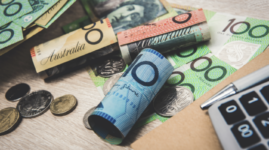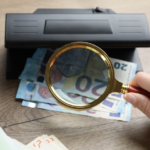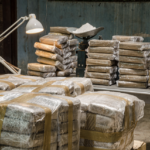Criminal Offences Relating to Counterfeiting in New South Wales

Money makes the world go round, so it’s no surprise that some individuals are tempted to pass off ‘counterfeit’ (fake) paper money, coins or securities for their own benefit.
In many cases, passing off counterfeit money as real would amount to the offence of general fraud under section 192E of the Crimes Act 1900 (NSW).
However, there are also a number of specific offences related to counterfeit money under the Crimes (Currency) Act 1981 (Cth), which applies throughout Australia.
Here’s what you need to know.
What is counterfeit money?
Counterfeit money is defined under the Crimes (Currency) Act (‘the Act’) as:
- any article, not being a genuine coin or genuine paper money, that resembles, or is apparently intended to resemble, or pass for, a genuine coin or genuine paper money; or
- any article, being a genuine coin or genuine paper money, that has been altered in a material respect and in such a manner as to conceal, or to be apparently intended to conceal, the alteration.
This definition includes any such article “whether it is or is not in a fit state to be uttered and whether the process of manufacture or alteration is or is not complete”.
A related concept of a “counterfeit prescribed security” also applies under the Act. A “security” is a fungible, negotiable financial instrument that holds some type of monetary value.
Examples include stocks, bonds and debt agreements.
A “counterfeit prescribed security” means:
- any article, not being a prescribed security, that resembles, or is apparently intended to resemble, or pass for, a prescribed security; or
- any article, being a prescribed security, that has been altered in a material respect and in such a manner as to conceal, or to be apparently intended to conceal, the alteration;
This includes any such article whether it is or is not in a fit state to be uttered and whether the process of manufacture or alteration is or is not complete.
A “prescribed security” means any bond, debenture, stock, stock certificate, treasury bill or other like security, or any coupon, warrant or other document for the payment of money in respect of such a security, issued by the Commonwealth of Australia, by an authority of the Commonwealth of Australia or by, or with the authority of, the government of a country other than Australia.
Finally, an “excepted counterfeit coin” means:
- any article, not being a genuine coin, that resembles, or is apparently intended to resemble, or pass for, an excepted coin; or
- any article, being an excepted coin, that has been altered in a material respect and in such manner as to conceal, or to be apparently intended to conceal, the alteration.
This includes any such article whether or not it is in a fit state to be uttered and whether the process of manufacture or alteration is or is not complete.
The offence of knowingly possessing counterfeit money
Under section 9 of the Act, it is an offence for a person to:
- have in his or her possession counterfeit money (not being an excepted counterfeit coin), knowing it to be counterfeit money; or
- have in his or her possession a counterfeit prescribed security, knowing it to be a counterfeit prescribed security.
- with intent to defraud, have in the possession of the person an excepted counterfeit coin, knowing it to be counterfeit money.
The maximum penalty for this offence is imprisonment for 10 years (if a natural person) or a fine of $156,500 for a body corporate.
Statutory defence of reasonable excuse
This offence does not apply if a person has a “reasonable excuse” for his or her conduct.
A reasonable excuse requires the defendant to put forward positive evidence that establishes to the satisfaction of the court:
- that he or she did not make the counterfeit money or counterfeit prescribed security; and
- that he or she did not, after the time when he or she first learned that the counterfeit money or counterfeit prescribed security was counterfeit money or a counterfeit prescribed security or the time when he or she acquired the counterfeit money or counterfeit prescribed security, whichever was the later time, have a reasonable opportunity to surrender it to a member of the Australian Federal Police or of the police force of a State or Territory or to any other person prescribed for the purposes of this section.
The offence of making counterfeit money
Under section 6 of the Act, it is an offence for a person to make or begin to make money or a counterfeit prescribed security.
The maximum penalty for this offence is imprisonment for 14 years (if a natural person) or a fine of $234,750 for a body corporate.
The offence of uttering counterfeit money
The offence of ‘uttering’ counterfeit money or counterfeit securities under section 7 of the Act refers to knowingly passing off counterfeit money or securities as genuine. It is an offence to:
- utter counterfeit money, knowing it to be counterfeit money; or
- utter a counterfeit prescribed security, knowing it to be a counterfeit prescribed security.
The maximum penalty for this offence is imprisonment for 12 years (if a natural person) or a fine of $187,800 for a body corporate.
Offences for buying or selling counterfeit money
Under section 8 of the Act, it is an offence to
- buy, sell, receive or dispose of, or offer to buy, sell, procure or dispose of, non-excepted counterfeit money or a counterfeit prescribed security.
-
with intent to defraud buy, sell, receive or dispose of, or offer to buy, sell, procure or dispose of, an excepted counterfeit coin.
The maximum penalty for this offence is imprisonment for 12 years (if a natural person) or a fine of $187,800 for a body corporate.
This offence does not apply if a person as a “reasonable excuse”.
General legal defences
In addition to statutory defences, a number of general legal defences may also apply to these charges including duress and sudden or extraordinary emergency..
In the event you are able to raise evidence of a legal defence, the onus then shifts to the prosecution to prove beyond a reasonable doubt that the defence does not apply in the circumstances.
You are entitled to an acquittal if the prosecution is unable to do this.
Going to court for a counterfeit money offence?
If you have been charged with a counterfeit money offence, call Sydney Criminal Lawyers anytime on 9261 8881 to arrange a free first conference during which one of our experienced criminal defence lawyers will advise you of your options and the best way forward, and fight for the optimal outcome.






